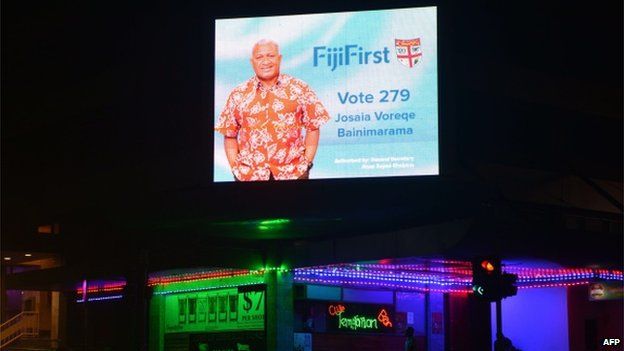Is Fiji on the road to democracy?
- Published

Voters in Fiji are going to the polls for the first time since military leader Voreqe "Frank" Bainimarama ousted the elected government in a bloodless coup eight years ago.
Mr Bainimarama has governed the Pacific nation since then and is running for civilian office. The BBC looks at the key points.
Why does this election matter?
The long-awaited vote is seen as a potential milestone on the road back towards a democratic system.
Mr Bainimarama overthrew Laisenia Qarase's government in 2006, accusing him of corruption and a bias towards ethnic Fijians. Since then the international community has been calling for an election to be held.
Sanctions were put in place by Australia and New Zealand to pressure the new government to hold a vote. Fiji was also suspended from the Commonwealth group of nations.
The polls have been welcomed and are seen as the first step to returning Fiji to civilian democratic rule.
What is the political background?
Fiji has seen four coups since 1987 mostly driven by tensions between indigenous Fijians and ethnic Indians, who make up about 40% of the population.
Mr Bainimarama has said he wants to end the coup cycle by easing these tensions.
This will be the first election in Fiji in which seats and the electoral register will be organised without regard to race. The new constitution drawn up under Mr Bainimarama gives ethnic Indians the same status as indigenous Fijians.
"[Mr Bainimarama] wants to take Fiji away from it's obsession with race politics. Under him everyone is a Fijian," said Stewart Firth, research fellow, state society and governance in Melanesia, at the Australian National University (ANU).
Will the poll be free?
About 590,000 voters will choose from 250 candidates for a new 50-seat parliament.
Mr Bainimarama, who stepped down as Commander of the Republic of Fiji Military Forces earlier this year, is running under his party FijiFirst. Six other parties have qualified to take part.
Voters will choose one candidate by their number on the ballot paper.
The government in Fiji has agreed to a monitoring group to oversee the vote led by Australia, India, Indonesia and Papua New Guinea.
Most people agree the process on the day will be above board. However, some of the steps taken by the government in the run up to the election have been called into question.
Like what?
The government has imposed tough minimum requirements on opposition parties, such as having a minimum of 5,000 paid members.
Some candidates involved in politics before the 2006 coup who have spent time outside the country are unable to participate because of residency requirements. The government has also limited campaigning for parties receiving funds from outside Fiji.
Former leaders Mahendra Chaudry and Laisenia Qarase are unable to run because of judicial proceedings. Critics have also argued that Mr Bainimarama enjoys unmatched prominence because there is currently no formal political opposition.
Press freedom has also been severely curtailed since the 2006 coup. Amnesty International said it had found "a climate of self-censorship and fear in Fiji, brought about by draconian laws and a pattern of intimidation and harassment of government critics".
All this means that the vote may be free but might not be called fair.
Who is in front?
Mr Bainimarama's FijiFirst is likely to win the highest number of votes. Whether it will be able to form a majority in parliament is unclear.
The Social Democratic Liberal Party, or Sodelpa, is seen as second in terms of public support, but would likely have to form a coalition.
Sodelpa, a reincarnation of the SDL party which had a majority in the 2006 election led by Mr Qarase, is now led by Ro Teimumu Kepa. Its members are mainly indigenous Fijians.
Other parties that qualified to contest the election include the Fiji Labour Party and the People's Democratic Party.
Will the election bring democracy?
Dr Firth, of the ANU, describes the poll as "an election that's been held by [a] military leader with a full expectation that he will win it".
But in order for Fiji to truly be on a path to democracy after the vote, observers say the government needs to implement some changes.
Although official censorship of media outlets ended in 2012, journalists face harsh penalties for being critical of the government. This has led to self censorship.
There has also been interference by the government in the appointment and dismissal of judges and lawyers.
In 2013, the government burned copies of a new constitution that had been written by Fijian and international experts. A replacement constitution enacted by the government ensures the military has a significant role in the country going forward.
Mr Firth says there are questions around whether Mr Bainimarama, who is used to ruling by decree, will be able to adapt to the compromises of a parliamentary democracy if he is voted in.
"Even if the election is relatively free and fair, it will not put Fiji back on a solid path to democracy. The 2006 coup has had a deep impact on Fiji governance and society," said Jenny Hayward-Jones in a policy paper for the Lowy Institute for International Policy.
She argues that "the fundamentals and the institutions of democracy have suffered in Fiji".
- Published23 August 2023